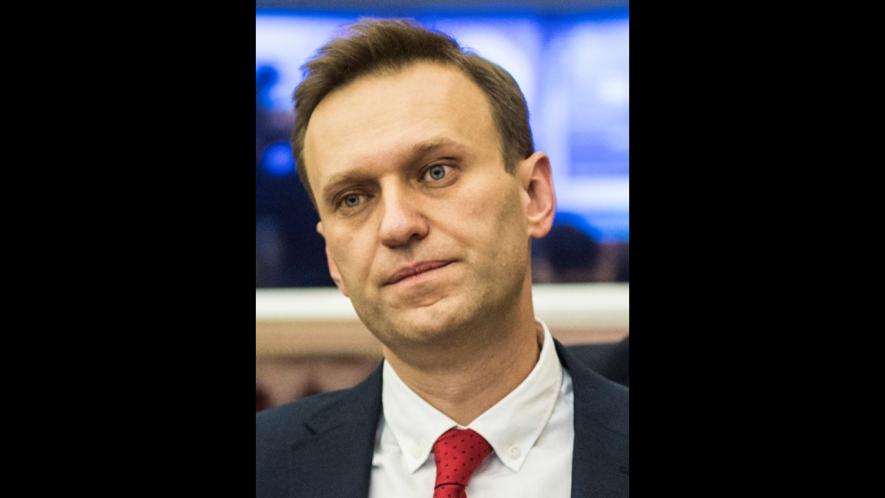Plane Carrying Comatose Russian Opposition Leader Lands in Germany

Image Courtesy: Wikipedia
Berlin: A plane carrying Russian dissident Alexei Navalny, who is in a coma after suspected poisoning, touched down early Saturday in Berlin, where he will be treated in the German capital's main hospital.
Navalny's spokeswoman and a representative of the NGO that arranged the flight, confirmed that the plane had landed. “Navalny is in Berlin,” Jaka Bizilj, of the German organisation, Cinema For Peace, told The Associated Press.
Navalny, a 44-year-old politician and corruption investigator who is one of Russian President Vladimir Putin's fiercest critics, was admitted to an intensive care unit in the Siberian city of Omsk on Thursday. His supporters allege that the tea he drank was laced with poison — and accused the Kremlin of being behind both his illness and the delay in transferring him to a top German hospital.
Navalny was allowed to be transported to Germany after reported wrangling that his supporters denounced as a “ploy by authorities to stall until any poison in his system would be no longer traceable.”
He was flown in to Berlin on a plane organised by supporters that was equipped with advanced medical equipment and accompanied by German medical specialists.
When German specialists arrived aboard a plane equipped with advanced medical equipment Friday morning at his family's behest, Navalny's physicians in Omsk initially said he was too unstable to move.
The Omsk medical team reportedly relented only after a charity that had organised the medevac plane revealed that the German doctors examined the politician and said he was fit to be transported.
Deputy chief doctor of the Omsk hospital, Anatoly Kalinichenko, then told reporters that Navalny's condition had stabilised and that physicians “didn't mind” transferring the politician, given that his relatives were willing “to take on the risks.”
The Kremlin denied that resistance to the transfer was political, with spokesman Dmitry Peskov saying that it was purely a medical decision. However, the reversal is said to have come after international pressure on Russia's leadership mounted.
On Thursday, leaders of France and Germany said the two countries were ready to offer Navalny and his family any and all assistance and insisted on an investigation into what happened.
The most prominent member of Russia's opposition, Navalny campaigned to challenge Putin in the 2018 presidential election but was barred from running. Since then, he has been promoting opposition candidates in regional elections, challenging members of the ruling party, United Russia.
His Foundation for Fighting Corruption has been exposing graft among government officials. But he had to shut the foundation last month after a financially devastating lawsuit from a businessman with close ties to the Kremlin.
Navalny fell ill on a flight back to Moscow from Siberia on Thursday and was taken to the hospital after the plane made an emergency landing. His team made arrangements to transfer him to Charité, a clinic in Berlin that has a history of treating famous foreign leaders and dissidents.
While his supporters and family members continue to insist that Navalny was poisoned, doctors in Omsk denied that and put forward another theory.
The hospital's chief doctor, Alexander Murakhovsky, said in a video published by Omsk news outlet NGS55 that a metabolic disorder was the most likely diagnosis and that a drop in blood sugar may have caused Navalny to lose consciousness.
Another doctor with ties to the politician, Dr. Anastasia Vasilyeva, said that diagnosing Navalny with a “metabolic disorder” says nothing about what may have caused it — and it could have been the result of a poisoning.
Ashikhmin, who has been Navalny's doctor since 2013, said the politician has always been in good health, regularly went for medical checkups and didn't have any underlying illnesses that could have triggered his condition.
Like many other opposition politicians in Russia, Navalny has been frequently detained by law enforcement. In 2017, he was attacked by several men who threw antiseptic in his face, damaging an eye.
Last year, Navalny was rushed to a hospital from jail where he was serving a sentence on charges of violating protest regulations. His team alleged poisoning then.
Get the latest reports & analysis with people's perspective on Protests, movements & deep analytical videos, discussions of the current affairs in your Telegram app. Subscribe to NewsClick's Telegram channel & get Real-Time updates on stories, as they get published on our website.


















